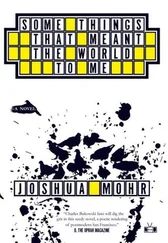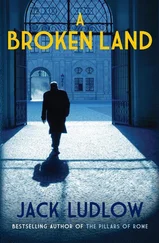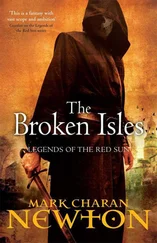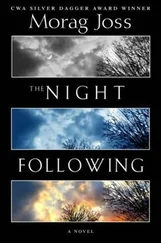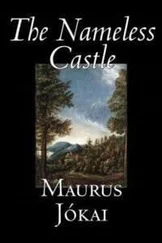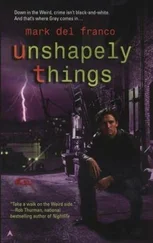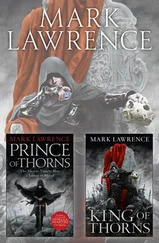Morag Joss - Half Broken Things
Здесь есть возможность читать онлайн «Morag Joss - Half Broken Things» весь текст электронной книги совершенно бесплатно (целиком полную версию без сокращений). В некоторых случаях можно слушать аудио, скачать через торрент в формате fb2 и присутствует краткое содержание. Жанр: Детектив, на английском языке. Описание произведения, (предисловие) а так же отзывы посетителей доступны на портале библиотеки ЛибКат.
- Название:Half Broken Things
- Автор:
- Жанр:
- Год:неизвестен
- ISBN:нет данных
- Рейтинг книги:3 / 5. Голосов: 1
-
Избранное:Добавить в избранное
- Отзывы:
-
Ваша оценка:
- 60
- 1
- 2
- 3
- 4
- 5
Half Broken Things: краткое содержание, описание и аннотация
Предлагаем к чтению аннотацию, описание, краткое содержание или предисловие (зависит от того, что написал сам автор книги «Half Broken Things»). Если вы не нашли необходимую информацию о книге — напишите в комментариях, мы постараемся отыскать её.
Loners Jean, Micheal and Steph are drawn together to Walden Manor by a mixture of deceit, good luck and misfortune. There, they shape new lives, full of hope and happiness. When their idyll is threatened they discover their new lives are worth preserving. But at what cost?
Half Broken Things — читать онлайн бесплатно полную книгу (весь текст) целиком
Ниже представлен текст книги, разбитый по страницам. Система сохранения места последней прочитанной страницы, позволяет с удобством читать онлайн бесплатно книгу «Half Broken Things», без необходимости каждый раз заново искать на чём Вы остановились. Поставьте закладку, и сможете в любой момент перейти на страницу, на которой закончили чтение.
Интервал:
Закладка:
Steph smiled as the resulting pink paste disappeared into Charlie’s mouth. After a second’s astonished smacking of his lips and widening of his eyes, he opened his mouth for more. Within four mouthfuls he was laughing and turning the stuff over in his mouth. Everyone applauded. It was his first taste of anything besides milk, and because they had watched it together the event was, it went without saying, theirs alone, a private joy; nothing whatsoever to do with Sally.
They went back to the picking. The strawberries mounted up in a large plastic bowl that Jean had brought from the laundry room. It was the end of the season. Most of the whole strawberries had lost their gloss and grown dull and deviant-looking; this was the riff-raff, the small, the reticent, late-forming and grudging fruit, and it was already almost too late. Some of the berries were so ripe that as they were picked they burst in the fingers and landed in the bowl as wet, scented rags. The warm heap of exposed flesh in the bowl would, within a very few hours, begin to mist over with a blue-green bloom of mould.
Even though they discarded the rotten fruit and all the stunted berries that were almost white on one side, the quantity was almost threatening. Jean began to re-calculate the amount of sugar she would need. But there would have been even more strawberries, Michael said, if he had known more about them back in April.
‘In April,’ he told them when they had nearly finished, ‘you’ve got to nip off the first blossom, it encourages more fruit. I read it in one of the gardening books, only,’ he said, heaving the bowl of strawberries from the ground up onto his hip, ‘not until May.’
Steph had already picked up Charlie and was following Michael back to the house, trailing his blankets on the grass behind her. So they were too far away to hear, that was all. They were simply too far away to hear, so of course did not reply when Jean said, dreamily, ‘Oh well, never mind that now, we’ve got plenty. And there’s always next year.’
They could not have heard. They had reached the end of the walled garden, crossed the sunlit lawn and were moving between the borders of rose bushes into the jagged shadow of the corner of the house. Jean stared after them until they disappeared round the side. She thought, watching them go, ‘They didn’t hear me. So I could pretend that I never said that, that it was never even thought of, let alone said. I could pretend that, even to myself.’ She stooped down, ruffled through the clumped leaves of a couple of strawberry plants, with a hand that was shaking. She could hear her own heart beating. Finding nothing worth picking, she stood up again. She should go back to the house. There were things to do. There was no reason for her to stand out here, with the sun beating down, as if she were waiting for something. But then it came, as she knew it would, as she stood unwilling or unable to move, an old ache gathering weight somewhere inside her.
Of course I never did go to university. Mother wouldn’t put up the money and in any case, she said, she needed me at home. (By the way, I’m sorry to keep going back to Mother, and I’m not confessing anything in the sense of owning up to something I should not have done. She drove me too far.) The clock money paid for a secretarial course, and the rest went on my board, Mother’s point being that I had left school and until I was earning why should she stump up for everything if, after the course was paid for, I was still ‘sitting on a goldmine’. Hardly a goldmine. I began to get angry with Father for saying the clock would get me through college. I even began to wonder if by college he actually had meant Technical College, a year learning to type and file and do shorthand and organise the boss’s diary? If so, it was just cruelty on his part to have let me run on with thoughts of proper university. I could scarcely believe it of him, and he had always told me I could be a teacher, like him. But then his dying and leaving me felt like an act of cruelty also. All those years I spent thinking ill of him, of course I regret them now, but I was misled.
After college I was never out of work, Mother would have to concede that. I kept the money coming in, not that secretaries earn much, and I was there at the end of every day. I fed her the usual things at the usual times, making sure that nothing on the plate had a noticeable taste. Anything that might be described as having what I now consider flavour she would have refused, because she did not like anything unexpected in her mouth. She said anything with a taste came back on her. Steamed fish, mashed potato. Semolina. Yes, I looked after her and I was never out of work, and before I knew it, those two facts were all I had to put in place of achievements, not that they added up to enough to be proud of. Nothing in the actual work I did, in any one of the places where I was employed over the years, interested me in the slightest. Most of the time I scarcely noticed what I typed or took down in my shorthand pad or filed away or said politely on the telephone. I was a pleasant enough colleague, I think, not difficult or hostile, but I did not care one way or the other about the work that went on, and over time that becomes indistinguishable from mental dullness. I could be relied upon to do as I was asked, nothing more. It seemed enough to me. Ditto at home with Mother, although I did develop what she called a ‘nasty sarcastic streak’. I know what she meant. I could sometimes come out with remarks that were rather bitter-sounding. And sarcasm without wit (which I have never possessed) comes across rather sourly. Without quite realising it, I became sour.
I had long, long since stopped going to Mr Hapgood’s, of course. Once or twice towards the end I saw through the glass bit of the shop door that there was a woman with dyed blonde hair behind the counter, and on those days I walked on home. Gradually I stopped even looking to see if she was there and didn’t go near the place. Mr Hapgood had grown a little distant, anyway, by then.
Incredible, you will be thinking, that she could even think of carrying on with that awful man, even after she knew he was getting married? How could anyone be so naПve? But it wasn’t naПvetй, quite, although I was as ignorant and unwise as the next provincial schoolgirl in 1951, and out of my depth. If you think depravity’s involved, I’m not even sure I was much less depraved than he was. But there was more to it than that. I had been lonely since Father died and at the end of every school day my heart sank at the thought of going home. At least going to Mr Hapgood’s put that off for an hour. At least, in the smoky back of the shop, I got a welcome of sorts.
And I think I was overwhelmed by something else, a sort of knowledge that had been growing over the years, more in my bones than in my brain, a thing I just knew without noticing I’d been learning it. So when I told Mr Hapgood that yes, I would keep coming, it felt not like a decision that I was making but like a reflex reaction to a blow that I had been expecting. It was quite clear and unsurprising. The fact was that with Father gone, I had nobody. Nobody. The feeling this gave me was unbearable, as if I were made of something weighty but without colour or life, like damp ashes, so worthless I could be swept into a sack and tipped out somewhere and never be missed. So I would have clung to anyone who stopped me feeling like that. I would have stuck to anyone who wanted me, and I was in no position to much mind who they were, or even what it was they wanted me for.
So for a time Mr Hapgood was a kind of intermittent relief from that feeling. But when that episode finally closed the feeling came back, of course, and I managed to live for years and years either feeling it or in danger of feeling it, so it turned out not to be unbearable after all, in the strict sense. I bore it, I even learned to pretend it wasn’t there. But I’ve done enough of that now. I cannot bear to feel like that ever again, not now that I have been truly free of it, living here.
Читать дальшеИнтервал:
Закладка:
Похожие книги на «Half Broken Things»
Представляем Вашему вниманию похожие книги на «Half Broken Things» списком для выбора. Мы отобрали схожую по названию и смыслу литературу в надежде предоставить читателям больше вариантов отыскать новые, интересные, ещё непрочитанные произведения.
Обсуждение, отзывы о книге «Half Broken Things» и просто собственные мнения читателей. Оставьте ваши комментарии, напишите, что Вы думаете о произведении, его смысле или главных героях. Укажите что конкретно понравилось, а что нет, и почему Вы так считаете.
